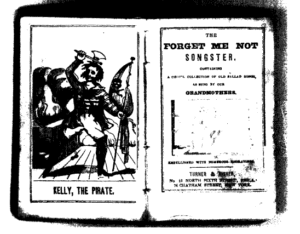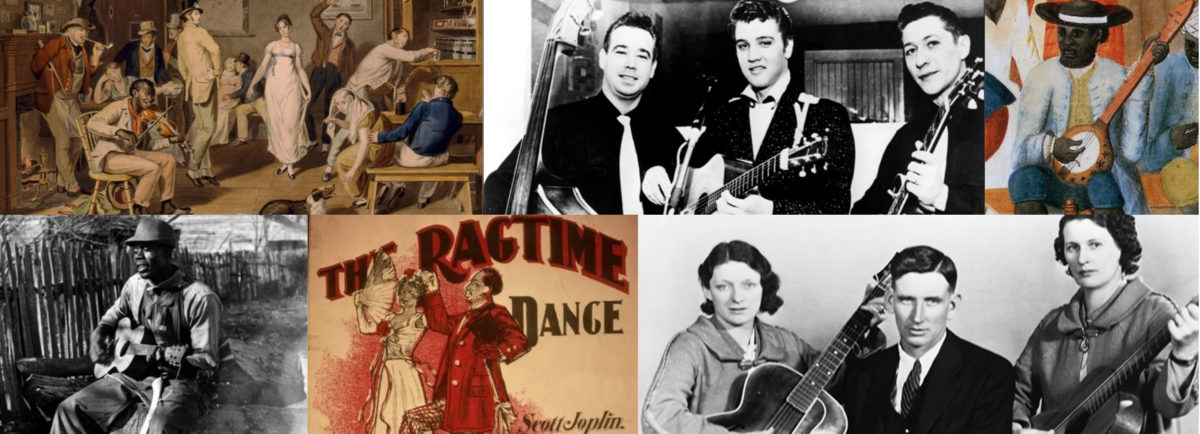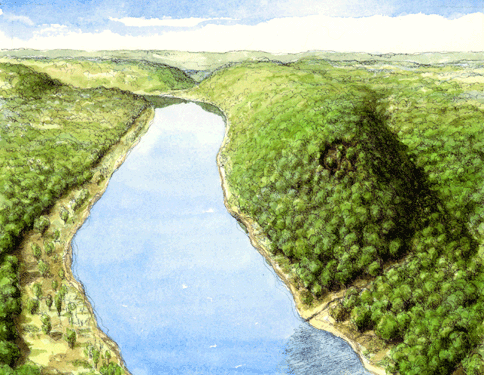Overview
"The Lovely Ohio" is an American folk song that arose from unknown sources in the United States during the late 18th or early 19th century. It celebrates the opportunities available in the Ohio River Valley, inviting settlement into lands that had long been the source of conflict between French and British colonists and Indigenous Americans.
Historical Background
During the 16th, 17th, and 18th centuries, European nations that were establishing colonies in the Americas frequently clashed with each other and with Native American populations. In 1756, years of territorial struggle between the British and French in the Ohio River Valley resulted in the outbreak of the Seven Years' War, known in the colonies as the French and Indian War. Both sides established alliances with local Native American tribes. With the defeat of the French in 1763, the British gained control of Canada and all land east of the Mississippi River.
The French had generally respected Native American traditions in the Great Lakes region, and they established good trade relationships. When the British took control of the area following the Seven Years' War, they restricted the tribes' ability to trade and provoked distrust and hostility. Pontiac, a leader of the Odawa people, organized a violent uprising against the British confederacy that included nearly every tribe from Lake Superior to the lower Mississippi. Pontiac's War, or Pontiac's Rebellion, reached a negotiated end in 1766.
In an effort to minimize further confrontations in the region, the British government issued the Proclamation of 1763 which forbade English settlement west of the crest of the Appalachian Mountains. It established the land as Indian territory. Colonists disregarded the proclamation and continued to settle in the territory, resulting in further violent clashes with local tribes. In an effort to quell the violence and quiet colonial discontent with the proclamation, the British government established subsequent treaties that acquired additional Indian land for British settlement.
It would not be enough. The Declaration of Independence cited "raising the conditions of new appropriation of lands" as part of the justification for freeing the thirteen colonies from British rule. At the end of the American Revolution, Great Britain legally recognized the independent existence of the United States of America. Britain ceded claims not only on their colonies but also on the lands between the Appalachian Mountains and the Mississippi River.
The Northwest Ordinance of 1787 officially established the Northwest Territory, which included the Ohio River Valley. The new law set conditions for settling in the territory and addressed the rights of the Native Americans living there.
The utmost good faith shall always be observed towards the Indians; their lands and property shall never be taken from them without their consent; and in their property, rights, and liberty, they shall never be invaded or disturbed, unless in just and lawful wars authorized by Congress.
This was not to be. The violence continued as a growing population of Anglo-American settlers came to inhabit Indian lands. A series of United States government treaties and policies, backed by the U.S. Army, forced the tribes onto reservations west of the Mississippi River by the middle of the 19th century.
Song History
Songs about the lives of common people that opened with the call "come all ye" were very popular in the British Isles in the 18th century. In the early United States, the "come all ye" format was the foundation for many new songs about the American experience.
A song called "The Banks of the Ohio" appeared in the Forget Me Not Songster: Containing a Choice Collection of Old Ballad Songs, As Sung By Our Grandmothers, published in 1842. More than a dozen slightly different versions of songsters were published in the mid-19th century with this name. The subtitle Containing a Choice Collection of Old Ballad Songs, As Sung By Our Grandmothers suggests that the books included songs that were known perhaps fifty years earlier.

Melodies were not printed in the books, but the lyrics to "The Banks of the Ohio" are very similar to those in the song now known as "The Lovely Ohio."
Come all you young men who have mind for to range
Into the Western country, your station for to change
For seeking some new pleasure we'll all together go
And we'll settle on the banks of the pleasant Ohio
The 1941 book Songs of Yesterday: A Song Anthology of American Life, by Philip D. Jordan and Lillian Kessler, includes "We'll Hunt the Buffalo!" with lyrics virtually identical to "The Lovely Ohio," except for the addition of a repeated chorus. The melody, "arranged" in the book by A. Briff is also very similar to "The Lovely Ohio" melody. The following words are attributed only to "F.M."
We'll Hunt the Buffalo!
Come all you brisk young fellows, who have a mind to roam
Unto some foreign country, a long way from home
Unto some foreign country along with me to go
And we’ll settle on the banks of the lovely Ohio
chorus (sung after each verse):
Sweet and shady groves!
Thro’ the wild woods we’ll wander,
and we’ll hunt the Buffalo,
And we’ll hunt the Buffalo,
Thro’ the wild woods we’ll wander,
and we’ll hunt the Buffalo.
Come all ye pretty fair maids, and spin us some yarn
To make us some nice clothing, to keep ourselves warm;
For you can knit and sew, my loves, while we do reap and mow,
When we settle on the banks of the lovely Ohio.
There are fishes in the river just fitted for our use;
There’s tall and lofty sugarcane that yields us some juice;
There is all kind of game, my boys, beside the buck and doe,
When we settle on the banks of the lovely Ohio.
If ever those wild Indians do unto us come nigh,
We will all unite, together, lads, to conquer or to die;
We will march into their tents, boys, and strike the deadly blow,
When we settle on the banks of the lovely Ohio.
Lyrics
Following are the lyrics as printed in Alan Lomax's 1960 book Folk Songs of North America. Lomax's source for the lyrics and melody is singer Ed McCurdy's recording from his 1956 album, A Ballad Singer's Choice. The liner notes for the album do not indicate McCurdy's source for the song, but the lyrics and melody are very similar to "We'll Hunt the Buffalo!" above, with one of the verses and the repeating chorus eliminated.
The Lovely Ohio
Come all ye brisk young fellows who have a mind to roam
All in some foreign country, a long way from home
All in some foreign country, along with me to go
And we'll settle on the banks of the lovely Ohio
We'll settle on the banks of the lovely Ohio
Come all you pretty fair maids, spin us some yarn
To make us some nice clothing to keep ourselves warm
For you can knit and sew, my loves, while we do reap and mow
When we settle on the banks of the lovely Ohio
When we settle on the banks of the lovely Ohio
There are fishes in the river, just fitted for our use
There's tall and lofty sugar cane that will give to us its juice
There's every kind of game, my boys, also the buck and doe
When we settle on the banks of the lovely Ohio
When we settle on the banks of the lovely Ohio
Recordings
Matthew Sabatella and the Rambling String Band's version of "The Lovely Ohio" is based on the printed lyrics and melody in Folk Songs of North America.
Ed McCurdy opened his 1956 album A Ballad Singer's Choice with "The Lovely Ohio." In the liner notes, McCurdy writes that the song is "a very good song of its type and era. The words sound honest and the tune sings along with good humor."


